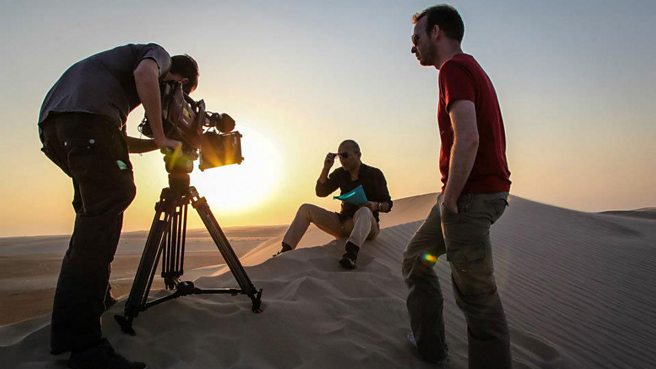Unit 1: Nice to meet you!
Asking questions
Select a unit
- 1 Nice to meet you!
- 2 What to wear
- 3 Like this, like that
- 4 The daily grind
- 5 Christmas every day
- 6 Great achievers
- 7 The Titanic
- 8 Travel
- 9 The big wedding
- 10 Sunny's job hunt
- 11 The bucket list
- 12 Moving and migration
- 13 Welcome to BBC Broadcasting House
- 14 New Year, New Project
- 15 From Handel to Hendrix
- 16 What's the weather like?
- 17 The Digital Revolution
- 18 A detective story
- 19 A place to live
- 20 The Cult of Celebrity
- 21 Welcome to your new job
- 22 Beyond the planets
- 23 Great expectations!
- 24 Eco-tourism
- 25 Moving house
- 26 It must be love
- 27 Job hunting success... and failure
- 28 Speeding into the future
- 29 Lost arts
- 30 Tales of survival
Session 3
Be a journalist
Language in Action: Practise question forms by preparing to interview Keith Wallace, a BBC travel journalist. You'll write some questions for an interview with him and then you'll hear his answers.
Activity 1
Writing interview questions
A dream job!
Keith Wallace is a BBC journalist who works on The Travel Show. He visits lots of interesting places all over the world. For some people it probably sounds like Keith has got 'a dream job'.

To do
Prepare to interview a BBC travel journalist.
In this activity you will make some questions to ask Keith about his life and work. If you need help with the grammar of questions, have a look at the grammar reference area.
Compete the activity
Rearrange the words to make questions.
8 Questions
You're going to write some questions for the BBC travel journalist, Keith Wallace, to answer.
Help
Activity
You're going to write some questions for the BBC travel journalist, Keith Wallace, to answer.
Hint
Try looking at the materials in session 2 to help you with this activity.Question 1 of 8
Help
Activity
You're going to write some questions for the BBC travel journalist, Keith Wallace, to answer.
Hint
Try looking at the materials in session 2 to help you with this activity.Question 2 of 8
Help
Activity
You're going to write some questions for the BBC travel journalist, Keith Wallace, to answer.
Hint
Try looking at the materials in session 2 to help you with this activity.Question 3 of 8
Help
Activity
You're going to write some questions for the BBC travel journalist, Keith Wallace, to answer.
Hint
Try looking at the materials in session 2 to help you with this activity.Question 4 of 8
Help
Activity
You're going to write some questions for the BBC travel journalist, Keith Wallace, to answer.
Hint
Try looking at the materials in session 2 to help you with this activity.Question 5 of 8
Help
Activity
You're going to write some questions for the BBC travel journalist, Keith Wallace, to answer.
Hint
Try looking at the materials in session 2 to help you with this activity.Question 6 of 8
Help
Activity
You're going to write some questions for the BBC travel journalist, Keith Wallace, to answer.
Hint
Try looking at the materials in session 2 to help you with this activity.Question 7 of 8
Help
Activity
You're going to write some questions for the BBC travel journalist, Keith Wallace, to answer.
Hint
Try looking at the materials in session 2 to help you with this activity.Question 8 of 8
Excellent! Great job! Bad luck! You scored:
Next
You now have eight questions for Keith. What do you think he will say? Is his job a dream job? Let’s find out.
Session Grammar
In English, there are two basic types of question.
1. Yes/no questions often begin with the verb to be, but can also begin with other auxiliary verbs, such as do.
We ask these when we want a yes or no answer.
2. Wh-questions start with a question word, such as who, what, where, when, why or how.
We ask this type of question when we want different kinds of information. These questions cannot be answered with a yes or no.